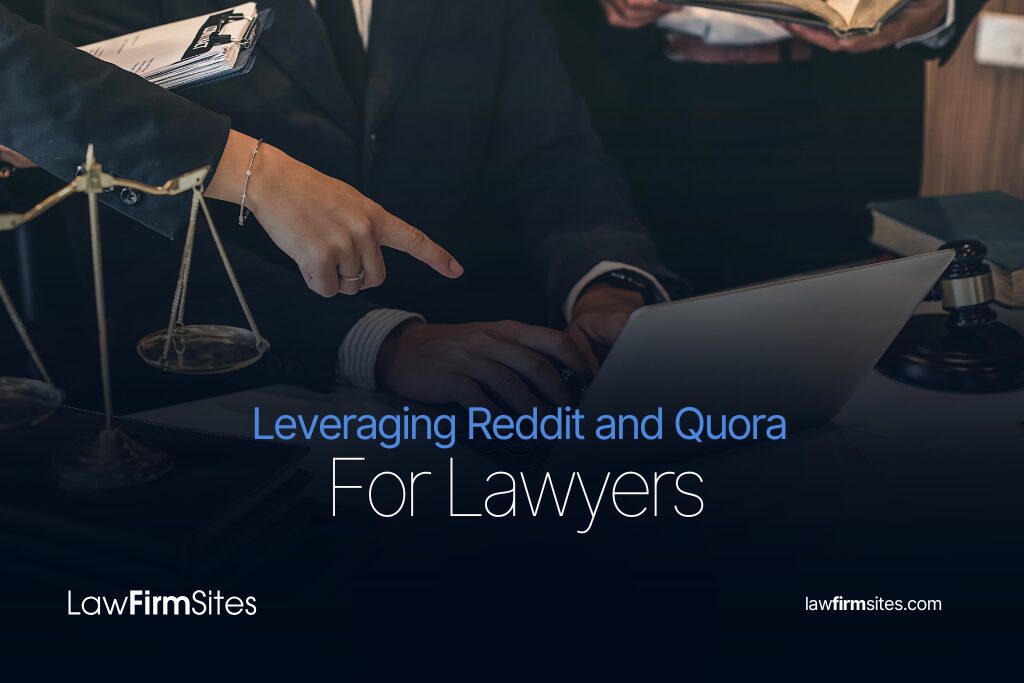Leveraging Reddit and Quora for Lawyers

Reddit and Quora have become everyday stops for people searching for quick answers and first‑hand experiences, including those with urgent legal questions. For law firms, these platforms can reveal client intent, trending issues, and phrasing that mirrors real‑world queries. Used thoughtfully, they can inform a strategy that elevates visibility and trust. This article explains how lawyers can use Reddit and Quora responsibly while building stronger, search‑optimized content on their own sites.
Reddit and Quora explained
Reddit functions as a network of interest‑based communities where long discussion threads often surface nuanced problems, including those related to family law, personal injury, criminal defense, immigration, and estate planning. On the other hand, Quora is a Q&A platform where people ask direct questions and receive answer‑style responses that can read like concise articles.
Understandably, both channels help reveal how non‑lawyers describe issues in natural language, which is the same language they use in search queries. For research and discovery, these communities are valuable for understanding user intent, common misconceptions, and the follow‑up questions that matter most.
The Role of Reddit and Quora in Information Gathering
Lawyers can study the phrasing of posts and answers to spot recurring keywords, colloquial terms, and jurisdiction‑specific concerns that shape editorial calendars. Threads often expose gaps in public understanding, which can inspire comprehensive guides, FAQs, and explainers that perform well in search. Community upvotes and sustained engagement hint at what readers find useful, which is a proxy for content value and potential search demand. Monitoring these signals helps craft pages that align with the questions people actually ask, improving topical authority and on‑page relevance.
Can Lawyers Use Reddit and Quora in Creating Legal Content?
Lawyers can definitely leverage Reddit and Quora, provided that there are guardrails that protect confidentiality, accuracy, and ethics. Consequently, lawyers should avoid discussing specifics of any matter and never reveal client information, even in anonymized form, because de‑identification can fail when details are unique. Disclaimers stating that posts are informational and not legal advice help set expectations, and directing readers to the rules of professional conduct in the relevant jurisdiction reduces the risk of inadvertent attorney‑client relationships. When responding on the platform, use conservative language, cite primary sources such as statutes or court websites when possible, and encourage readers to seek individualized counsel for decisions.
Advertising, Solicitation, and Platform Rules
Most jurisdictions regulate attorney advertising, solicitation, and real‑time electronic communications, which can apply to social responses that invite direct engagement. Posts should avoid promises of outcomes, unverifiable claims, or comparisons that imply superiority. Profile pages and bios should be accurate and include jurisdiction, practice areas, and a brief disclaimer that the information is general and educational. Because platform policies change, review the latest community guidelines and any promotional rules before posting links or calls to connect off‑platform.
Avoiding Accidental Attorney‑Client Relationships
A casual exchange can be misread as individualized advice, especially when the user supplies facts. Keep responses general, reference publicly available resources, and avoid follow‑up questions that invite specific facts about ongoing matters. Encourage readers to schedule a formal consultation through appropriate channels if they need actual representation, and make clear that posting does not create an attorney‑client relationship. Save copies or screenshots of your own posts to maintain a record of wording and disclaimers.
Understanding the 3Cs (Conflicts, Confidentiality, and Competence)
Conflicts
Conflicts can arise when a public comment touches a matter involving a current or former client, an adverse party, or a topic that is substantially related to a live or prior engagement. Before posting, pause to assess whether your response could materially limit your duties of loyalty or independent judgment. If there is any chance that a user’s scenario overlaps with your docket, refrain from weighing in and avoid even generalized commentary that might be tied back to the matter. Direct readers to neutral resources or high‑level explainers on your firm’s site rather than engaging on facts that could implicate party interests.
Confidentiality
Confidentiality extends beyond names and case numbers to include details that could allow someone to deduce a client’s identity or strategy. Do not share anecdotes from practice, even “sanitized,” if the combination of dates, facts, or locations could enable re‑identification. Be cautious when quoting statutes, filings, or orders that are not readily accessible to the public, and avoid linking to documents that could reveal sensitive information without context. When offering educational guidance, keep examples hypothetical, minimize specifics, and include a clear statement that you are providing general information, not advice.
Competence
Competence on public platforms means answering only within your licensure, experience, and the jurisdictional rules that apply. If a thread falls outside your depth or involves a state where you are not admitted, point readers to official court pages, government portals, or bar‑approved materials. Clarify that the law varies by jurisdiction and that timelines, forms, and remedies differ, which is why individualized counsel is essential for real decisions. When a topic deserves nuance you cannot responsibly provide in a short post, publish a carefully reviewed explainer on your site, and reference it for those who want to learn more.
Reddit or Quora: Which is the Better Option?
Reddit and Quora are helpful for research and brand visibility, but owned content almost always drives more durable organic traffic. A well‑structured practice area hub with clear headings, definitions, process explanations, and jurisdiction‑specific details can rank for a wide constellation of long‑tail queries. Pair these with robust FAQs, schema markup, and internal links that guide readers from questions to actionable guidance pages. When you publish authoritative articles supported by citations to statutes, court forms, and government sites, you build trust signals that Reddit or Quora alone cannot deliver.
Building a Search‑Ready Content Framework
Start with topics surfaced by community questions and group them by intent, such as definitions, eligibility, timelines, costs, forms, and outcomes. Write pages that answer each intent category in plain English, then support them with examples, process steps, and links to official resources. Use descriptive titles, concise meta descriptions, and headers that echo the exact phrasing people use in questions. Over time, this framework grows into a content hub that captures both short queries and nuanced, conversational search.
Strengthening E‑E‑A‑T Signals
Search engines reward content that shows E-E-A-T (experience, expertise, authoritativeness, and trust). For legal pages, this can include a named attorney author with credentials, jurisdiction, and a brief bio, plus dates of last review to show freshness. Include citations to statutes, rules, or court instructions and provide transparent explanations of limits and risks. Add a clear disclaimer that the page is informational and invite readers to request a consultation through proper intake, which keeps advice off public threads while preserving user trust.
How Reddit and Quora Can Still Support Growth
Use these platforms to test which topics spark engagement before investing in long articles. Share distilled insights by linking to in‑depth guides on your site only when community rules allow, and focus on helping first rather than driving clicks. Track which discussions correlate with organic traffic lifts by noting publication dates and comparing search performance in analytics. If a thread exposes a widespread misunderstanding, respond with a neutral explanation on the platform and develop a companion explainer page for your site.
Things to Consider Before Using Reddit and Quora for Lawyers
- Audience tone varies widely across communities, and direct self‑promotion can backfire, so lead with clarity and empathy. Jurisdictional differences can create pitfalls because a correct answer in one state may mislead a reader in another, which is why on‑site guides should name the state and cite official sources.
- Time investment matters because short replies often trigger follow‑up questions, so plan boundaries for engagement and decide in advance how often you will participate.
- Accessibility and professionalism also count, so write in plain language, avoid jargon, and use respectful phrasing that reflects the duties of the profession.
Building a Workflow that Respects Ethics and Efficiency
Create a research routine where you review threads weekly, log recurring questions, and map those questions to pages on your site or ideas for new articles. Draft posts in a document first with a brief disclaimer, then paste to the platform to reduce the chance of oversharing. If a reply surfaces a topic that deserves depth, write the full article on your site and link sparingly where rules allow. Treat every public interaction as a reflection of your firm’s values and maintain a uniform voice that is informative and calm.
Measuring Impact Without Overcommitting to Platforms
Set simple indicators such as organic impressions for target keywords, time on page for guides inspired by threads, and assisted conversions from informational pages. Watch for branded search increases after periods of steady, helpful engagement. If metrics rise after you publish platform‑informed content, strengthen that section with internal links, schema, and updated examples. Over time, your site becomes the primary destination while Reddit and Quora remain listening posts and outreach channels.
Ethical outreach and community trust
Communities reward contributors who cite primary sources and acknowledge uncertainty where it exists. When you share links, make sure they point to pages that answer the exact question, not generic homepages. Avoid language that pressures readers to call immediately or share personal facts in public threads. The goal is to enhance public understanding while guiding people toward safe, private channels for any decision that affects rights, money, or freedom.
Explore and Leverage for your Firm’s Social Growth
Reddit and Quora can spark ideas, surface real questions, and help craft content that answers what people actually ask. For long‑term growth, convert those insights into well‑structured guides, FAQs, and practice area hubs on your own site, supported by citations to official sources and clear disclaimers. Keep engagement ethical, empathetic, and measured so you build trust while protecting duties to clients and courts.
If you need an extra hand building that on‑site foundation, our resources and guides at Law Firm Sites can help shape a durable, search‑ready content strategy without pressure or hype.
Did you like this post? Here are some others you might enjoy:

For most law firms, growth depends on being visible at the exact moment a potential client searches for help. Pay‑per‑click…

Strong legal marketing rewards depth. When potential clients face high-stakes decisions, they search for thorough, trustworthy guidance that clearly explains…

Data is the most reliable guide for growing a law firm website because it shows what clients actually search, where…

